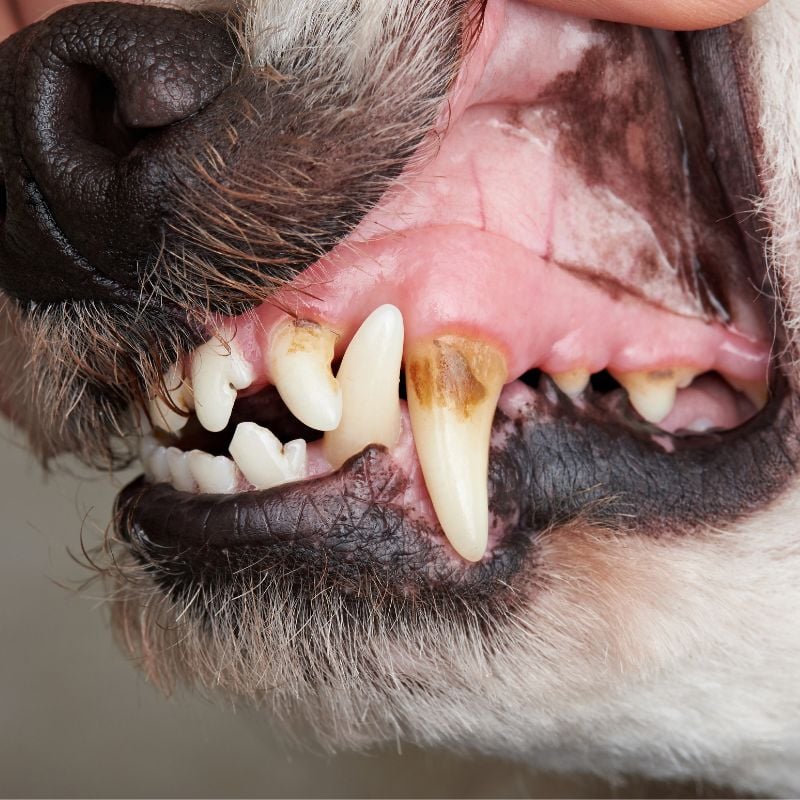 February is National Pet Dental Health Month and we want to help raise awareness of how important it is to take care of your pet’s teeth! There is a lot of misunderstanding about how to take care of your pet’s teeth so let’s jump right in. A lot of pet owners think that fur babies can take care of their own teeth and do not need to take preventative measures like us humans. In fact, they do need help taking care of their teeth and there are multiple ways to take care of them. Unfortunately, if you do not take care of them, they can develop periodontal disease, tooth decay, cavities, injured teeth and other oral health problems. If left untreated it can cause other health issues including kidney disease, heart disease and costly dental care.
February is National Pet Dental Health Month and we want to help raise awareness of how important it is to take care of your pet’s teeth! There is a lot of misunderstanding about how to take care of your pet’s teeth so let’s jump right in. A lot of pet owners think that fur babies can take care of their own teeth and do not need to take preventative measures like us humans. In fact, they do need help taking care of their teeth and there are multiple ways to take care of them. Unfortunately, if you do not take care of them, they can develop periodontal disease, tooth decay, cavities, injured teeth and other oral health problems. If left untreated it can cause other health issues including kidney disease, heart disease and costly dental care.
We are going to go through what to look out for, how to inspect your pets’ teeth, what preventative measures you can do at home to help prevent dental disease.
How Can I Tell if My Pet Has Bad Dental Health?
- Smell: A foul smell coming from the mouth, this includes saliva. Their breath is not expected to smell good, but it shouldn’t smell foul. This can indicate there is something going on in the mouth and should be looked at by your veterinarian ASAP.
- Inflamed gums: Healthy gum color should be light pink (unless there is pigmentation) and not look red, irritated, or swollen.
- Blood present: This can be a bloody mouth, gums or gum line, or bloody saliva. There should never be blood coming from your pet’s mouth, this can indicate numerous things, not only dental disease. If this occurs, seek veterinarian care immediately.
- Difficulty chewing: If you notice your pet is only chewing from one side, having trouble chewing all together, having food fall from their mouth and or not eating, this can be a sign you need to get to the vet ASAP.
What You Should Be Looking For When You Check Your Pets Mouth?
Plaque and Tartar are the two indications that your pet is developing dental disease. The first buildup of material growing on the enamel of the tooth within hours of your dog eating. Plaque combines with dog saliva, builds up and hardens, resulting in damage causing tartar. Plaque buildup is comprised of various organic materials such as bacteria, serum, food particles and mineral salts. In the early stages, tartar begins as soft matter on the tooth enamel, but will build-up and harden as time passes. Tartar build up can cause gum inflammation and disease, tooth decay, abscesses and other oral infections impacting a dog’s overall health.
Can different sized dogs have different teeth problems?
Smaller breeds such as toy breed dogs may have an increased risk for tartar formation, gum recession, and eventual loss of teeth. Whereas large breed dogs in addition to dental tartar build-up, are also at a higher risk for tooth fracturing due to aggressive chewing. Such fractures can lead to decay, infection, tooth loss and disease.
What Are Some Preventative Steps You Can Do At Home For Your Pet?
Brushing your pets’ teeth is the top veterinarian recommended preventative care step you can do for your pet. We have dental kits available here at Newport Harbor Animal Hospital and always are recommended to start brushing when your fur baby is young to get them used to it and part of their daily routine.
- Dog toothbrushes come in all sizes and in general are soft and angled to easily reach the back teeth. We recommend using a toothbrush specific to species, but if you want to buy one over the counter, we strongly recommend a pediatric toothbrush due to the size and bristle strength. Some dog owners prefer “finger brushes” which are soft silicone brushes you insert for finger into for brushing.
- NEVER USE HUMAN TOOTHPASTE. ONLY use veterinarian-approved toothpaste for dogs. Check the ingredient list to ensure there is no xylitol. Xylitol is potentially fatal to dogs. Dental wipes can be used daily to remove plaque but should not be used in place of brushing.
- While there are other alternatives to taking care of your pet’s teeth like diet and dental treats, always consult with your veterinarian to make sure you are getting the appropriate one to fit your pets lifestyle.
For more information on how to brush your pet's teeth, head to our Video Center.
Schedule a Dental Exam
To get a better idea of the steps you should be taking to help your pet with their dental health, make an appointment with us today. The doctor will go over if a dental is needed or what products you can use to help prevent additional progression of dental disease. These recommendations can include a brushing schedule, dental treats and dental diets! If your pet needs a dental, don't wait to schedule it because we are giving away goodie bags with dental treat samples, dental preventative care product list and dental care tips! These will be given during your release appointment after completion of your dental in February (while supplies last)! Happy National Pet Dental Health Month!

